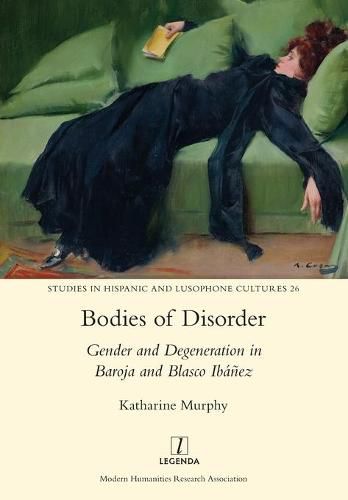Readings Newsletter
Become a Readings Member to make your shopping experience even easier.
Sign in or sign up for free!
You’re not far away from qualifying for FREE standard shipping within Australia
You’ve qualified for FREE standard shipping within Australia
The cart is loading…






This title is printed to order. This book may have been self-published. If so, we cannot guarantee the quality of the content. In the main most books will have gone through the editing process however some may not. We therefore suggest that you be aware of this before ordering this book. If in doubt check either the author or publisher’s details as we are unable to accept any returns unless they are faulty. Please contact us if you have any questions.
Discourses of degeneration (social, political, medical) peaked in the 1890s across Europe, and posited the moral and biological decline, even sterility, of European nations. In early twentieth-century Spain, the novels of Pio Baroja and Vicente Blasco Ibanez both assimilated and subverted the cultural myths of degeneration that were fuelled by influential European theorists such as Benedict Morel, Cesare Lombroso and Max Nordau. In the light of widespread anxieties about reproduction and national decadence, this interdisciplinary book traces the creative tension between each author’s literary representations of the degenerate female body and the consumer agency of women readers. Through its alignment of gender paradigms and degenerationism in Baroja and Blasco Ibanez, Bodies of Disorder offers a challenge to established hierarchies of canonical and popular fiction. Countering Baroja’s resounding public disdain for his Valencian contemporary, Katharine Murphy repositions Blasco as markedly closer to the so-called ‘Generation of 1898’ than hitherto acknowledged.
Dr Katharine Murphy is Senior Lecturer in Hispanic Studies at the University of Exeter. Author of Re-reading Pio Baroja and English Literature (2004), she has published widely on Comparative Literature and Spanish Modernism.
$9.00 standard shipping within Australia
FREE standard shipping within Australia for orders over $100.00
Express & International shipping calculated at checkout
This title is printed to order. This book may have been self-published. If so, we cannot guarantee the quality of the content. In the main most books will have gone through the editing process however some may not. We therefore suggest that you be aware of this before ordering this book. If in doubt check either the author or publisher’s details as we are unable to accept any returns unless they are faulty. Please contact us if you have any questions.
Discourses of degeneration (social, political, medical) peaked in the 1890s across Europe, and posited the moral and biological decline, even sterility, of European nations. In early twentieth-century Spain, the novels of Pio Baroja and Vicente Blasco Ibanez both assimilated and subverted the cultural myths of degeneration that were fuelled by influential European theorists such as Benedict Morel, Cesare Lombroso and Max Nordau. In the light of widespread anxieties about reproduction and national decadence, this interdisciplinary book traces the creative tension between each author’s literary representations of the degenerate female body and the consumer agency of women readers. Through its alignment of gender paradigms and degenerationism in Baroja and Blasco Ibanez, Bodies of Disorder offers a challenge to established hierarchies of canonical and popular fiction. Countering Baroja’s resounding public disdain for his Valencian contemporary, Katharine Murphy repositions Blasco as markedly closer to the so-called ‘Generation of 1898’ than hitherto acknowledged.
Dr Katharine Murphy is Senior Lecturer in Hispanic Studies at the University of Exeter. Author of Re-reading Pio Baroja and English Literature (2004), she has published widely on Comparative Literature and Spanish Modernism.